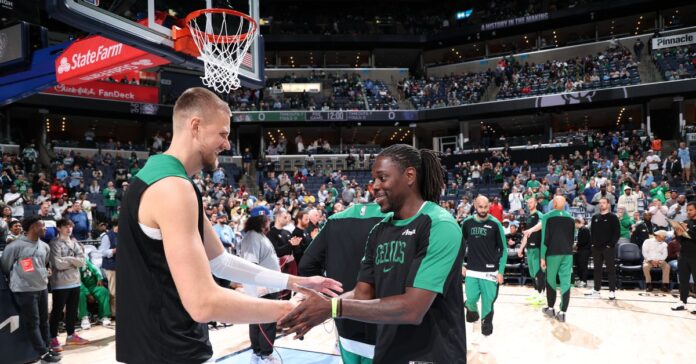The Celtics have traded Jrue Holiday to the Portland Trail Blazers, ESPN’s Shams Charania first reported.
In return, they’ve acquired Anfernee Simons and two second-round picks. Whether they’ll retain Simons — or trade him in the coming weeks — remains to be seen. Simons is on an expiring $27.7 million contract and will be an unrestricted free agent next summer.
The move helps move the Celtics inch closer to being under the famed second apron. It marks the Celtics’ first offseason transaction — and the official breakup of the 2024 championship core.
In his two-year tenure with the Celtics, Holiday averaged 11.8 points, 4.9 rebounds, and 4.4 assists per game. He shot 46.4% from the field and 39.2% from three.
In the Celtics’ championship run, he averaged 13.2 points on 50.3% shooting, hitting 40.2% from three. Those numbers increased in the Finals – he averaged 14.4 points, 7.4 rebounds, and 3.8 assists in the 2024 NBA Finals.
Jrue Holiday has three years left on his contract; he’s slated to make $32.4 million next season, $34.8 million in the 2026-27 season, and $37.2 million the year after that.
Celtics are now one step closer to being under the second apron with the move
Two months ago, Celtics governor Wyc Grousbeck said in an interview with WEEI that the Celtics’ current tax bill was unsustainable. Without re-signing Al Horford and Luke Kornet, the Celtics are already nearly $20 million above the second apron – with $227.8 million projected salary between 12 players under contract.
Several basketball penalties come with being above the second apron, including:
- Being unable to use the mid-level exception
- Being unable to use cash in trades
- Being unable to trade first-round picks seven years out.
- Being unable to engage in sign-and-trade deals that keep the team over the cap
- Having their first round pick automatically move to the end of the round if they’ve been in the second apron three out of the past five years
“It’s not the luxury tax bill, it’s the basketball penalties,” Grousbeck said then. “The new CBA was designed by the league to stop teams from going crazy and they decided that it’s not good enough to just go after the wallets because then the fans are like ‘hey, find someone who can afford to spend whatever — $500 million per year or whatever it is.”
This story will be updated as more information is available.





















